Coronavirus: Portable kit to test NHS staff for virus to be ‘available in weeks’
‘It’s difficult to broadly state testing time but it’ll take at least a day to get results whereas we can get a test result in 50 minutes,’ a doctor says
Your support helps us to tell the story
From reproductive rights to climate change to Big Tech, The Independent is on the ground when the story is developing. Whether it's investigating the financials of Elon Musk's pro-Trump PAC or producing our latest documentary, 'The A Word', which shines a light on the American women fighting for reproductive rights, we know how important it is to parse out the facts from the messaging.
At such a critical moment in US history, we need reporters on the ground. Your donation allows us to keep sending journalists to speak to both sides of the story.
The Independent is trusted by Americans across the entire political spectrum. And unlike many other quality news outlets, we choose not to lock Americans out of our reporting and analysis with paywalls. We believe quality journalism should be available to everyone, paid for by those who can afford it.
Your support makes all the difference.A portable coronavirus test kit that takes just 50 minutes from sample to result could be available for use on NHS staff within weeks, a scientist has said.
The kit, which works from a throat swab, is a molecular test to establish if a person currently has Covid-19.
It could be used in a hospital anteroom, processing 16 samples at a time and displaying the result on a smartphone.
Dr Justin O’Grady, research group leader at the Quadram Institute in Norwich, said the test kit aims to help self-isolating medical staff to return to work as quickly as possible and ensure those at work are not spreading the virus.
“Most testing, results are taking 24 to 48 hours because they’re tested centrally,” said Dr O’Grady, who is an associate at the University of East Anglia.
“It depends on the hospital set-up, it depends how far you have to send the sample, hospitals are doing screening in batches.
”They’re all ramping up so turnaround times are coming down but they’ve all got more samples to test.
“It’s difficult to broadly state the testing time ... but it’ll take at least a day to get results whereas we can get a test result in 50 minutes.”
Dr O’Grady started developing the kit earlier this month with microbiologist Jonathan Edgeworth at Guy’s and St Thomas’s NHS Foundation Trust in London.

It is hoped that a pilot study will begin to test staff at St Thomas’ Hospital by the middle of next week, Dr O’Grady said, with the hospital then to “rapidly make a decision whether that’s working well”.
“We have to move super quick, so we would hope to be implementing this in some way in hospitals in two weeks or so,” he said.
“We have to be careful of health and safety and we have to be sure we have a test that performs to a certain standard but these are extraordinary times so we would try to do that and get that process validated as quickly as we could.”
He said a semi-skilled healthcare professional would run the tests, and they could be carried out near to patients.
“You could run it in an anteroom, where blood gases are tested in hospital, where there’s machinery just off the ICU,” said Dr O’Grady.
“You can run 16 samples at a time on this little machine and it’s a portable device, it’s inexpensive, you get the readout on a mobile phone.”
He said it could provide additional capacity for NHS staff testing and could help at pinch points such as emergency rooms.
“If you want to screen staff, for example, you might have 30 staff on an ICU,” he said. “We could test all those staff in the morning, within two hours, and tell the staff whether they’re well or potentially sick, whether they need to go home, or if staff send in a swab we can tell them whether they can likely come back to work if they’re self-isolating because maybe a child in the family has had a cough or something like that.
”We’re just trying to keep staff at work or get them to go home if they’re a risk to patients.
“What we’re hoping to do is make sure that nobody who has maybe mild or very mild disease who’s able to transmit the disease is actively treating patients as that is dangerous and can spread the disease within the hospital to vulnerable patients.
”Then we want to make sure we can get doctors back to work as quickly as we can.
“And then we also want to make sure that hospitals that are further away from central testing are given the opportunity to have a rapid screen for staff but potentially even for patients if the test’s performance is good enough for diagnostic purposes.”
The work is currently being funded by various existing grants within departments, with no official funding at present.
PA

Join our commenting forum
Join thought-provoking conversations, follow other Independent readers and see their replies
Comments